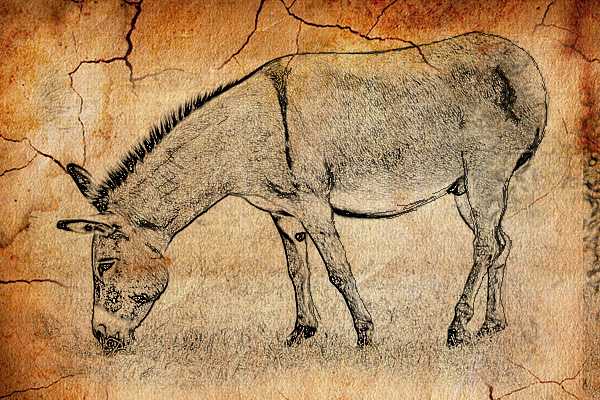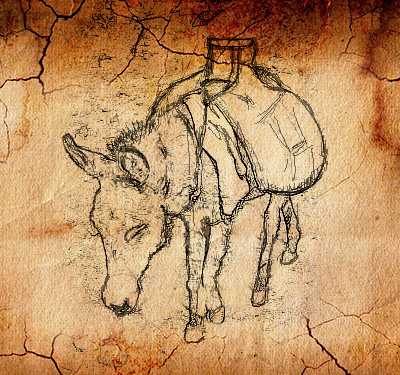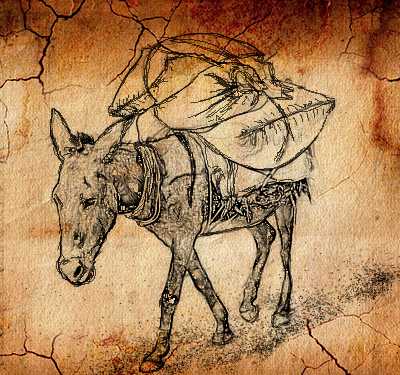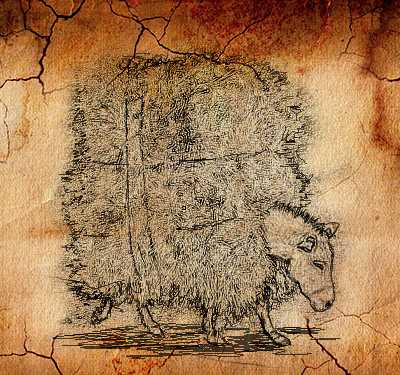The Limping Donkey
The amazing story of a mysterious limping donkey in a village in the highlands of Eritrea who was fondly celebrated by his community.
 I sat outside my grandparent’s home in Adi Mengonti, with my cousin Andé. It was a late June afternoon, during the rainy season in the highlands of Eritrea. The cattle, sheep, off-duty oxen, donkeys and mules that normally spend their days grazing fresh new green grass in the pastures outside the village, had not come back to their stables for the night.
I sat outside my grandparent’s home in Adi Mengonti, with my cousin Andé. It was a late June afternoon, during the rainy season in the highlands of Eritrea. The cattle, sheep, off-duty oxen, donkeys and mules that normally spend their days grazing fresh new green grass in the pastures outside the village, had not come back to their stables for the night.
It has always amazed me how they walk to their homes with no one guiding or corralling them. They just know when it is time; time to start slowly stroll up the hill, up the winding trails to make it home just in time when the sun disappears into the horizon.
During those home-coming hours, their sounds could be heard throughout the village: the sheep and calves bleating, the cows lowing, the bulls and steers bellowing, the donkeys braying. Dogs in turn bark through out the land, either to protect their family turf or just to welcome their friends.
It was not quite that time yet. While enjoying the crisp, cool highland breeze with Andé, a curious donkey was grazing not far from us. Now, this is not strange. Donkeys, mules and horses that were on duty during the day, may not have gone to the green valleys to graze and socialize with their comrades. So they get an early day off and can be seen wandering within the village. Of these, I remember the lucky ones who get barley grain as their reward for all the work they put in throughout the day. They loved it. But also, their minders know that this delicious grain keeps them calm as their loads are taken off their strained backs. It could be a ksha full of flour from the grain mills or a girba full of water from the village wells.
Our donkey looked different, however. Although fit and healthy, he had a limp. But he looked so much in his own zone and relaxed that he would not look up when village men and women trudge past him on their way back from the fields or the market or whatever the day had in store for them. His limp was so significant that most likely he didn’t do the strenuous work his brothers the donkeys, and his cousins the mules and horses did.
In general, when a beast of burden is injured and can’t work, they become a liability for their households as all they do is consume hay and feed without contributing anything in return. So the household has to make a not-so-comfortable decision to let the non-contributing family member go; either by taking them to the market or …
Anyway, he was not let go; he looked well taken care of after all and that is what made it curious.
Andé, looking at how curiously I was studying the beast, began to speak.
“You see this scarred donkey,” he said pointing at the large scar on the donkey’s haunch, “he is quite a legendary donkey.” More curious now, “How?” I inquired. Andé started narrating his story…
One eventful night, a family about to end their day, gathered around the main living space of their *mereba’e, a thick-walled, spacious, normally one-room cottage with a corrugated metal roof. As always, the youngest boy was sent to check if all the animals had made it home and were all accounted for. After a little while, the boy came in running, announcing that their donkey was missing!
This is of great significance to any family in the village. A donkey’s contribution to the household is not like any other. A lot of people would marvel at the power and elegance of a horse. But a horse needs a good rider, or an intricate cart with gadgets to control his awesome strong muscles. Even more, a horse is too high to easily put loads on his back. He can’t be readily handled by everyone in the family. A mule would be preferable. But in this part of the world, a mule is very expensive; arguably even more than a horse. Mostly, only the village’s who-is-who families own mules. A mule was preferred by the nobility in the bygone era. In peace times, the chiefs and dignitaries preferred the smooth trotting ride of a mule over the bouncy gallop of a horse. A mule ride is also better for the aging hips of a graying chiqa, kentiba, msliene, degiat or rae’si and any title holder in between. Mules don’t give birth - I have heard a miracle or two - but they don’t making them always available in their prime years. So they are valued dearly. There’s a saying used to glorify “patience’ by paralleling it to the price of a mule. “A’qli wagga beQli” it goes; “Patience is as precious as a mule”. That tells it I am sure. But a donkey…
A donkey is very laid-back almost all of the time. Anyone in the family from the seven year all daughter to the aging grandfather can handle him with less concern for safety. His short stature makes it easy to put loads on him; by even the shortest person in the family. Because of that, he is involved in every aspect of the household’s daily hauling needs.
A donkey’s day would start early in the morning. The young boy would get the girba, a pair of water-tight bladders that resemble sacks that are connected in the middle and hang on both sides of the donkey. He would place it on the back of the donkey and fasten it securely. The boy would usually ride the donkey down the winding trails to the wells in the valley surrounding the village. The donkey would carry about ten gallons of water up the hill. It is not unusual to hear intermittent, short, high-pitched, cracking sounds as the donkey negotiates the strenuous rocky climb. He passes gas.
 Donkey carrying water in girba, a pair of water-tight bladders that resemble grain sacks
Donkey carrying water in girba, a pair of water-tight bladders that resemble grain sacks
He gets his snack of barley in his special bowl while the water is drained into a bucket, and then unto the family’s barrel where the drinking water is kept. He is let off for a little rest before he may be called back for another duty.
Say, today mother needs to go to the mill to have a sack or two of grain ground. The burden had to be balanced and tightly fastened around his belly using a mets’an, a leather rope strap. Later on, a day at the mill would mean smelling all the aromas of freshly ground barley, wheat, sorghum, millet or chickpeas for shro. It must be a mouth-watering ordeal for him. Then comes the long walk back to the village and the uphill climb home. Mother has to endure more of the poor beast’s babble from his behind. Once home, he gets his little bit of barley during the unloading.
 Donkey carrying sacks full of grain
Donkey carrying sacks full of grain
That may not be all in store for him for the day. The donkey may be called for duty one more time before dusk to get some hay. The animals do need something to chew on during the evening. The cows, the bulls and the steers will most likely spend the night cudding while resting; this is when they regurgitate small portions of the vegetation they consumed during the day and digest it further by chewing on it. Quite a process! The hay from the last harvest is stored in common fenced areas on the outskirts of the village, in dome-looking stacks called qmiTos. Each household would have a qmiTo or two.
Once the donkey is loaded, only his head and legs would be visible under the gigantic round, Afro-looking pile of hay on top of him. The sight of his four skinny legs under the huge globe of hay seems comical, but it says a lot about his importance. Another climb up the hill and this time he would know that he is done for the day. What a day it was!
Such is the life of a donkey in the village. But it is a very important one for the family; all the animals and their human minders in the household depend on it.
Now, an animal family member who is not home in the evening is quite a worrisome ordeal. All the country around the village is prowled about by foxes and hyenas that come out at night. One can often hear their calls at night. So a family has to act quickly. One of the first actions they take is to go around to their immediate neighbors and ask if they have an extra donkey in their stables. Sometimes, animals stricken with love can venture to where their object of infatuation spends her night. They generally create some commotion in the strangers’ stables. The commotion they create gives away their presence and her minders kick out the rowdy young macho inharmoniously. Then he knows best to hasten home and be in the safety of his stable. I have seen Redda and Berih, my grandparents’ donkey and ox respectively, headbutting or kicking the gate door if they find it closed.
The family could not find the donkey in any of the neighboring stables they suspected. This calls for an escalation of the situation. What that entails is to call all the young men in their immediate neighborhood to join in a search for the stupid animal. The men curse at the beast for ruining their evening. Many of them would have been looking forward to getting a very good night’s sleep after a long day that had started at dawn. Village folks go to sleep an hour after the rooster goes to sleep. I am exaggerating a little bit but they do.
Now villagers realize finding the donkey is very important for two reasons. Firstly, a neighbor’s lost beast of burden would mean a tougher life ahead for all of them. Because the communal way of living dictates the neighbors will have to share their resources, in this case, their donkeys. That would put a strain on everyone’s life. And secondly, they have to show the predators in the area that it is the humans’ turf and that they are not welcome. If the predators start preying on any family’s donkey, then soon theirs would not be that safe either. So they went out with determination. The early tired grumbles quickly turned into a purposefulness of utmost resolve: “Let’s go get our donkey back!”
Those who have flashlights brought them out. Those that didn’t have them, wished there was enough moonlight or it was a starlit night sky out there. They brought out their best axes and strongest shaffo sticks that were slightly curved with a knuckle at the bottom. They hastened down the hill to the valleys where the pastures lay. They made noises to scare predators away and to get the cursed animal’s attention in hopes of getting him to run toward them.
They roamed the country around the village the whole night. Calling out in hopes that the donkey could hear them; donkeys do recognize their names. It was a very tiring ordeal and all of the men were exhausted. On the horizon, the light of dawn could be seen trying to push through the darkness. The land couldn’t show its beautiful colors yet; it was all dark grayish this time of the day.
For those with good eyesight, they could make silhouettes of trees or knolls or mounds here and there. One such young man was scanning the land with the little light the early dawn provided. He scrutinized every shape or movement he thought he saw. Then he saw something on a clearing on top of a little knoll. He couldn’t make the shape. It looked much bigger and longer than a donkey. He was not sure but he yelled, “I see something!” They all looked. But they were all confused about what it was.
The shape was quite at a distance. They ran quickly and closed in on the object. It was standing still but from time to time it would jerk a little bit. By the time they arrived at the scene, the light was much more and they could see; and what they saw, they could not believe.
Our donkey had bitten a hyena right on the back of the neck and holding on to it. His jaws were locked as if he were a true predator; snapping his jaws shut as a crocodile would when it ambushes a thirsty wildebeest, taking it down to the murky depth with it. The hyena did not seem to move. Its body just hung limb. It was dead.
The men could make out the blood-soaked side of the donkey. There was a big gaping wound on the donkey’s haunch. They could only imagine what must have happened.
Andé tells me what most likely happened. The donkey was grazing and, maybe, he found some nice juicy patch of grass in that season’s rainy blessings. He loses his herd or completely loses track of time. He would still have made it home even in the dark; like Redda, our family donkey, he would kick the gate of his home to alert his family.
But it must have been too late when he started heading home. A hyena, the most opportunist of predators, sees a lost, not-so-smart prey. Unlike the big cats that go for the neck, the hyena only looks for an opening to attack; the prey’s rear side or the soft underbelly. He jumped and clamped his fearsome jaws on the donkey’s rear side. The donkey must have panicked and started jumping and kicking. He would turn his neck as far as he could towards the excruciating pain he was experiencing. In panic, he would try to bite at whatever had gotten hold of him.
A hyena’s bite, one of the strongest, is known to crash a giraffe bone to get the marrow. So, the donkey’s frantic kicks and twisting would have only forced its flesh to tear off rather than causing the hyena to lose its grip.
But at that instance, with all the adrenaline in his veins, he must have turned to bite the hyena in pure reflex. He landed his bite perfectly on the hyena’s neck. It was the hyena’s turn to panic and desperately try to free himself. That dreadful stench of a hyena next to its nostrils must have sent the donkey berserk. He bit even harder severing the hyena’s spine. The hyena’s body goes limb; dead or still breezing matters no more.
By the time the men got there, the hyena was already dead but still hanging from the mouth of the donkey. It must have happened several hours before as they could see some of the blood had started to dry despite the still bleeding open wound.
An even more amazing thing happened. The men approached the donkey and tried to help the donkey let go of the dead monster. But he would NOT. That made him panic even more. When finally they got hold of the hyena, it became a tug of war with the donkey. Finally, they managed to slip it out of his exhausted jaws. At that very instant, he RAN; he ran home with pure terror.
There is a saying in Tigrinya that goes, ”FeraH ayiHazka.” Loosely translated, it means: “Do not be caught by a fear-stricken foe.” What happened was the embodiment of this saying.
The men laughed and forgot all about their exhausted bodies. They laughed all the way home to tell the tale of this epic battle fought in their lands. They laughed even more proudly because their own was the victor of this horrific death match. “If he recovers to live another day,” they reasoned, “he stays our own and he won’t toil for anyone any longer.”
So he grazes with no one bothering him.

